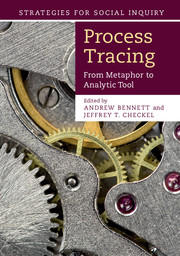KFG Workshop on Process Tracing Analysis with Jeff Checkel
Mar 02, 2016
Book Process Tracing
Image Credit: Cambridge University Press Link
On 20 January 2016, on the initiative of the KFG Postdocs, KFG Senior Fellow Jeffrey T. Checkel held a workshop on Process Tracing Analysis (PTA). The workshop benefited from the recently published book Process Tracing. From Metaphor to Analytic Tool, edited by Andrew Bennett and Jeffrey Checkel. The KFG Postdocs and PhD students as well as Postdocs from the Hertie School of Governance participated in the event.
In the first session, participants engaged in a vibrant discussion about the epistemological bases as well as the nuts and bolts of PTA in Political Science. The discussion focused on differences and complementarities between explanations based on causal mechanisms (such as PTA) and approaches based on covariation (such as large N quantitative analysis). Drawing on the analysis of original academic pieces that used PTA, the participants discussed the best practices in PTA applied not only to positivist-deductive research designs, but also to more interpretative-inductive approaches. The discussion also touched upon quite practical issues such as the amount of time and financial resources needed to conduct a good PTA, as well as how to meet the emerging transparency standards in the treatment of evidence and in the presentation of the results.
During the second part of the workshop, five participants presented their research proposals, stressing the role that PTA plays in them. Although Jeff took the lead in providing useful operational advice, all participants actively engaged in a very fruitful exchange of ideas and intuitions. How to operationalize and localize theories in order to make inference in particular political and regional settings, how to establish the probative value of single pieces of evidence, how to trace processes in settings with restricted access, and how to spell out the observable implications of different causal mechanisms – these were some of the issues that stood out during the session, to name a few.
The workshop triggered the research interest and the methodological imagination of all the participants who came away with a clearer picture of what PTA is and, most importantly, with the feeling that we learned something from each other.
Author: Stefano Palestini
